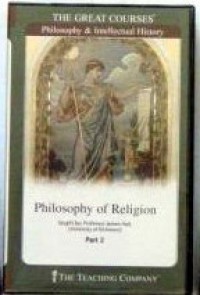4
Followers
9
Following
Clif's Book World
Adventures from reading books captured within short reviews.
Philosophy of Religion: The Great Courses - Philosophy & Intellectual History
 These thirty-six lectures are a look at religion from a philosophic point of view (not a look at philosophy from a religious point of view). These lectures take a look a the tools, words and ideas used by religion and evaluates the ability of religion to know what it believes. Following several introductory lectures there are eight lectures examining the various arguments (ontological, cosmological, teleological, divine encounter) for the existance of God. Then there are six lectures exploring the arguments (mostly centered on the problem of evil) for no God. Then the proposition that "evidence is irrelevant to faith" is examined, followed by an examination of the counter argument that "groundless faith is irrelevant to life." Then issues of "paradigms" are discussed. (Paradigm is one of my least favorite words.) Then the lectures explore the possibilities of finding truth in stories (fabulation).
These thirty-six lectures are a look at religion from a philosophic point of view (not a look at philosophy from a religious point of view). These lectures take a look a the tools, words and ideas used by religion and evaluates the ability of religion to know what it believes. Following several introductory lectures there are eight lectures examining the various arguments (ontological, cosmological, teleological, divine encounter) for the existance of God. Then there are six lectures exploring the arguments (mostly centered on the problem of evil) for no God. Then the proposition that "evidence is irrelevant to faith" is examined, followed by an examination of the counter argument that "groundless faith is irrelevant to life." Then issues of "paradigms" are discussed. (Paradigm is one of my least favorite words.) Then the lectures explore the possibilities of finding truth in stories (fabulation). The conclusion? Well, the lectures don't tell you what to think but provides this suggestion:
"Might this (brotherhood of man) not best begin with the admission that there is much to be said for agnosticism, especially among the faithful - that people do not necessarily know everything that they believe?"
After all, whatever we might believe, there's always a possibility that we're wrong.


